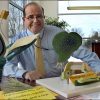Jorge A. Santiago-Blay
Lecturer
Besides serving as a Research Associate at the Smithsonian’s National Museum of Natural History, and as editor of his own peer-reviewed scientific journal, Life: The Excitement of Biology, Dr. Jorge Santiago-Blay enthusiastically and energetically pursues a vibrant and diverse research program that includes patterns and processes of evolution, plant chemistry, history of science, and the scholarship of teaching and learning, among others.
a. Evolutionary Biology: Patterns revealed and processes inferred from the study of the diversity of life through time. He has helped reveal that the mechanisms for the evolution and diversity of life on Earth probably were established hundreds of millions of years ago. Those projects include: 1) the pattern of presence and absence of appendages in the body of a 311-million-year-old fossil larva, Srokalarva berthei, which was possibly caused by Hox genes much like those present in modern insects, and 2) extinct kalligrammatid lacewings, approximately 165-120 million years old from China and Kazakhstan, evolved long, tubular proboscides, ovipositors, as well as scales and melanin-containing eyespots, millions of years before their modern look-alikes, butterflies and moths, had them.
b. Plant Chemistry: Modern exudates, copal, and amber of the world. Using Nuclear Magnetic Resonance (NMR, 13C- and 1H isotopes) spectroscopy, he has co-discovered that exudate chemical classification reflects closely modern plant classification, shedding light on the ethnobotanical uses of these materials. A large library of chemical signatures of plant exudates, useful to identify the botanical provenance of ancient ambers as well as resinous artifacts used by humans through history, is being put together.
c. History of Science: Many secrets remain to be revealed. He is pursuing several projects on the life and works of scholars, such as Rachel Carson, and on broad biological topics, such as the history of genetics before Mendel.
d. The scholarship of teaching and learning: Changes in pedagogical practices can help students succeed. Currently, he is measuring the impact of learning support activities and other interventions on students in biology courses for non-science majors to diminish their science anxiety and improve their performance.
Learn more about Dr. Santiago-Blay’s research.
